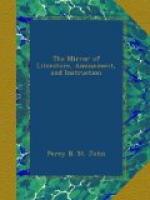Young poets often affect a melancholy strain, and none more frequently put on a sad and sentimental mood in verse than those who are as happy as an utter want of feeling for any body but themselves can make them. But in these verses the feeling was sincere and ominous. Miss Davidson recovered from her illness at Albany so far only as to be able to perform the journey back to Plattsburgh, under her poor mother’s care. “The hectic flush of her cheek told but too plainly that a fatal disease had fastened upon her constitution, and must ere long inevitably triumph.” She however dreaded something worse than death, and while confined to her bed, wrote these unfinished lines, the last that were ever traced by her indefatigable hand, expressing her fear of madness.
There is a something which I dread,
It is a dark, a fearful thing;
It steals along with withering tread.
Or sweeps on wild destruction’s
wing.
That thought comes o’er me in the
hour,
Of grief, of sickness, or
of sadness;
’Tis not the dread of death,—’tis
more,
It is the dread of madness.
Oh, may these throbbing pulses pause
Forgetful of their feverish
course;
May this hot brain, which burning, glows,
With all a fiery whirlpool’s
force,
Be cold, and motionless, and still
A tenant of its lowly bed;
But let not dark delirium steal—
* * * * *
The stanzas with which Kirke White’s fragment of the “Christiad” concludes, are not so painful as these lines. Had this however been more than a transient feeling, it would have produced the calamity which it dreaded: it is likely, indeed, that her early death was a dispensation of mercy, and saved her from the severest of all earthly inflictions; and that same merciful Providence which removed her to a better state of existence, made these apprehensions give way to a hope and expectation of recovery, which, vain as it was, cheered some of her last hours. When she was forbidden to read it was a pleasure to her to handle the books which composed her little library, and which she loved so dearly. “She frequently took them up and kissed them; and at length requested them to be placed at the foot of her bed, where she might constantly see them,” and anticipating a revival which was not to be, of the delight she should feel in reperusing them, she said often to her mother, “what a feast I shall have by-and-bye.” How these words must have gone to that poor mother’s heart, they only can understand who have heard such like anticipations of recovery from a dear child, and not been able, even whilst hoping against hope, to partake them.




